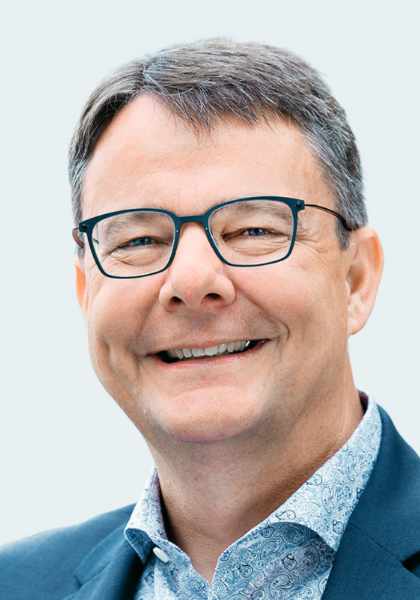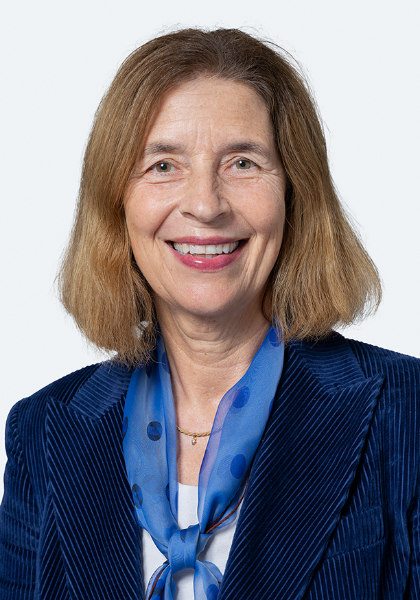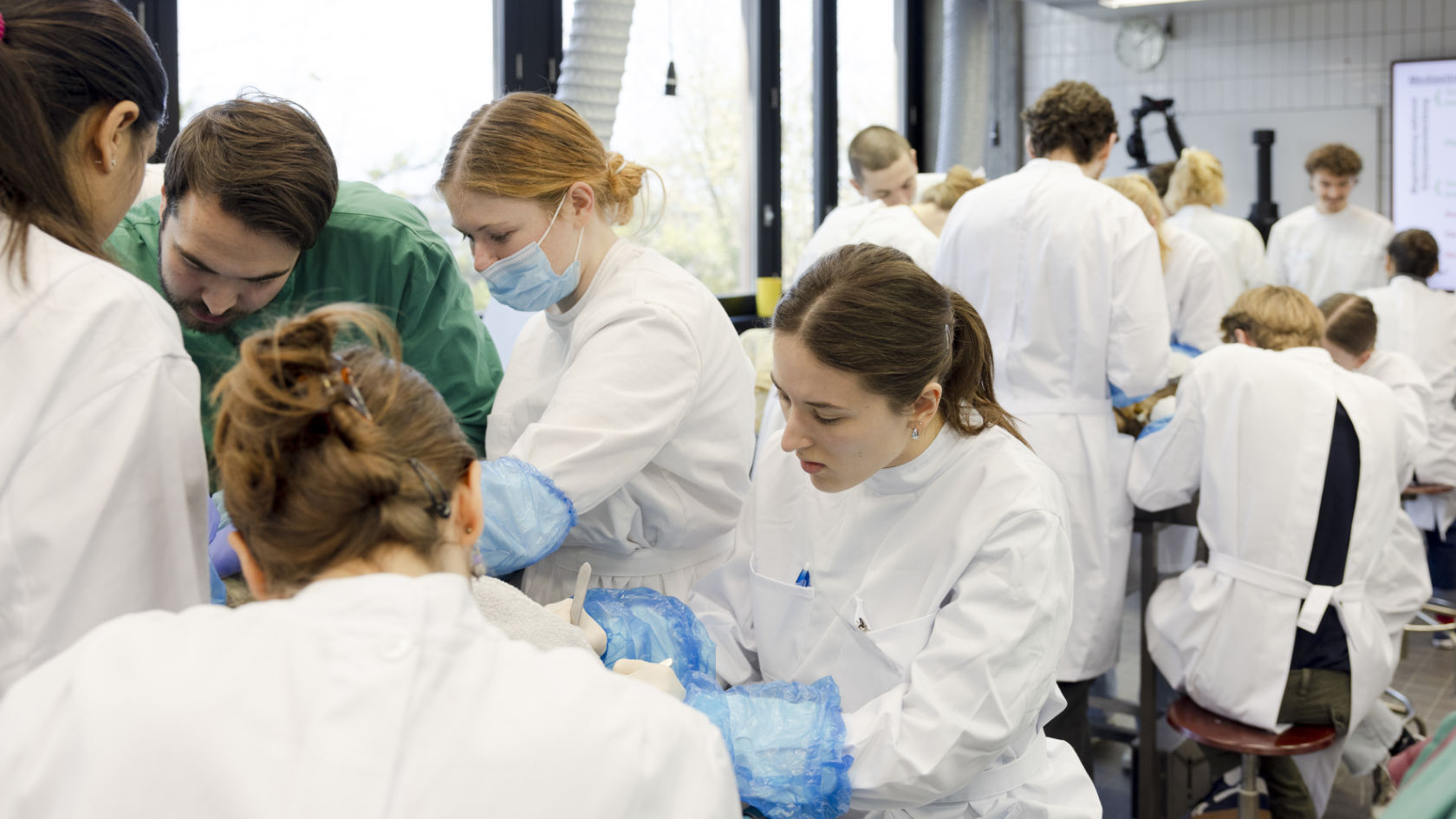“UZH is playing a pioneering role throughout Switzerland”
Doctors work hard every day to keep us healthy, and there is a high demand for medical professionals. Today, the Swiss healthcare system relies heavily on doctors who have studied abroad. Studies also predict that by 2040, there will be a shortage of around 5,500 to 8,700 physicians across Switzerland.
As a result of this, there are plans for more physicians to be trained in the canton of Zurich. The Med500+ project aims to increase the number of medical school places at the University of Zurich (UZH) from 430 today to 700 per academic year – making UZH the university that trains the most physicians in Switzerland. Moreover, this increase would also enable UZH to meet its own demand for academic talent. Taking all six academic years together, the number of medical students at UZH would rise from currently 2,600 to around 4,200.
Meeting the demands of the future
“The Med500+ project stands for modern and future-oriented medical education in Switzerland,” says UZH President Michael Schaepman. “We’re not only increasing the number of places available, but also developing the curriculum to meet future requirements. We are fulfilling our social responsibility to ensure excellent medical care and are proud to be a beacon of excellence in various areas of medical education.”

The Med500+ project stands for modern and future-oriented medical education in Switzerland.
The Government Council of the Canton of Zurich has approved the first phase of the Med500+ implementation plan and is now requesting the Cantonal Parliament to approve a project loan to fund its development. For more information, see the press release from the Zurich Department of Education (in German).
Beatrice Beck Schimmer, Director of University Medicine Zurich (UMZH), explains in an interview how UZH plans to increase capacity in medical studies:
When could the additional 270 students begin their medical studies at UZH?
Beatrice Beck Schimmer: The additional places should be ready in the Fall Semester 2030. This means that the first of these additional prospective doctors will begin their professional careers in 2036. By increasing our study places, UZH is helping to ensure long-term medical care for the population and reduce dependency on physicians trained outside of Switzerland. Currently, physicians trained abroad account for around 40 percent of all physicians working in Switzerland.
How is UZH preparing for the planned expansion?
Beck Schimmer: As part of the Med500+ project, we examined how the increased capacity could be realized and which staff, infrastructure and curriculum adjustments would be needed. An expansion to 700 study places is possible while maintaining the highest quality standards. This includes a curriculum reform, more teaching staff, additional clinical training places and modern infrastructure. UZH is thus taking on a pioneering role in the advancement of medical studies in Switzerland and aims to serve as a model for other cantons.

An expansion to 700 study places is possible while maintaining the highest quality standards. This includes a curriculum reform, more teaching staff, additional clinical training places and modern infrastructure.
What changes are planned for the curriculum?
Beck Schimmer: The student-centered and competency-based curriculum will include extensive clinical training, with a greater focus on practical experience during the Bachelor’s program. It will also allow students to define their areas of focus more clearly and develop their profiles. There will be a focus on general practice, psychiatry and pediatrics. Looking to the future, we also want to emphasize topics such as artificial intelligence, medical law, health economics and interdisciplinarity.
You mentioned the importance of practical experience in training future doctors. How can an increase in the number of study places be reconciled with more practical experience during the students’ education?
Beck Schimmer: One way is by introducing a four-week internship during the Bachelor’s program and setting up a new learning center with a simulation clinic where students can train for realistic clinical situations and emergencies. This would enable us to maintain a high proportion of practical instruction, even as student numbers increase.
Good supervision is a crucial quality factor in medical studies. Does UZH have enough teaching staff to implement the Med500+ project?
Beck Schimmer: UZH has taken this factor into account in the project from the outset. We are planning to create 10 new professorships and around 140 additional staff positions in teaching, supervision, and technical and administrative support.
Do hospitals have enough training places for the many additional students to acquire their skills?
Beck Schimmer: We can rely on the University Medicine Zurich (UMZH) network for this. It provides a strong link between the university and the university hospitals, i.e., the University Hospital Zurich, the University Children’s Hospital Zurich, the Balgrist University Hospital and the University Hospital of Psychiatry. Cooperation with the four partner hospitals – Zurich City Hospital, Winterthur Cantonal Hospital, Baden Cantonal Hospital and HOCH Health Ostschweiz Cantonal Hospital St. Gallen – as well as with more than 30 teaching hospitals also plays a key role. Internships are also to be offered not only in clinics but also in private practices.
The planned increase in the number of places is ambitious. How does this compare to other European countries?
Beck Schimmer: The human medicine degree program at UZH is already one of the largest in the German-speaking world. European and Anglo-Saxon medical schools typically offer between 100 and 400 spots. Medical schools in Berlin, Munich and Vienna each offer around 700 places. As part of Med500+, we have exchanged ideas with these universities. Their experience shows that high-quality degree programs of this size are possible, provided that sufficient funds are available for staff and infrastructure and the curriculum is designed accordingly.
What will the increase mean for those currently studying and teaching at the UZH Faculty of Medicine?
Beck Schimmer: The stakeholders of the Faculty of Medicine will be involved in the planning process. For students, this means that those who started under the old curriculum will complete their entire degree program under it. The first cohort of students will start the new degree program in 2030.
More students require more space. How is UZH addressing this issue?
Beck Schimmer: The long-term plan is to consolidate our medical education at the Irchel Campus. For capacity reasons, the required space cannot initially be provided there. The new learning center will therefore be temporarily located at another site. We’re currently reviewing three possible locations.
What are the requirements for the temporary and permanent locations?
Beck Schimmer: The infrastructure and equipment must be excellent, no matter the location. Theory and practice must be closely integrated. In addition, we need excellent conditions for interaction between our students and instructors. All of these factors ensure high-quality education.
